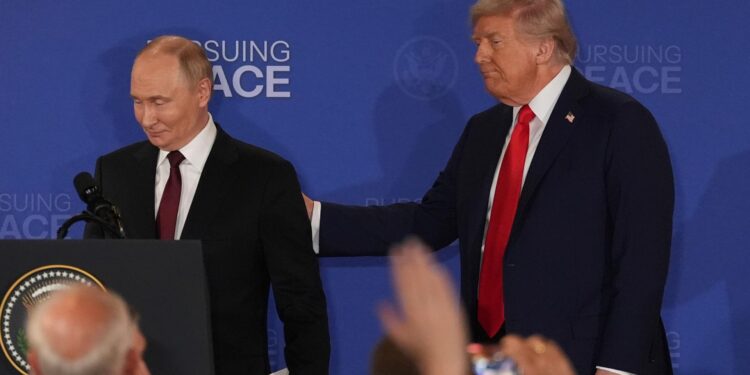Former President Donald Trump has taken a surprising lead in mediating the long-standing conflict between Armenia and Azerbaijan, unveiling a new peace framework that has effectively sidelined Russia’s traditional role in the region. In a development that reshapes geopolitical dynamics in the South Caucasus, Trump’s intervention marks a significant shift as Washington asserts greater influence over the fragile ceasefire and reconciliation efforts between the two nations. This emerging peace initiative underscores the evolving power play between global actors vying for strategic footholds in an area long dominated by Moscow.
Trump’s Unexpected Role in Mediating Armenia-Azerbaijan Peace Agreement
In a surprising turn of events, former President Donald Trump has taken center stage in brokering a tentative peace framework between Armenia and Azerbaijan, a conflict long dominated by Russian diplomatic efforts. Through a series of discreet back-channel communications and high-profile summits, Trump’s involvement has seemingly rejuvenated stalled negotiations and introduced fresh momentum into the peace process. This unexpected diplomatic intervention highlights a strategic pivot, as Washington asserts renewed influence in the South Caucasus, challenging Moscow’s traditional role as the primary mediator.
Key elements of the emerging peace framework include:
- Ceasefire enforcement mechanisms supervised by an international coalition
- Mutual recognition of territorial boundaries with provisions for disputed zones
- Economic cooperation initiatives aimed at rebuilding infrastructure damaged by years of conflict
- Commitment to prisoner exchanges and humanitarian aid access
| Stakeholder | Role | Impact |
|---|---|---|
| Donald Trump | Lead Mediator | Revitalized peace talks, reduced Russian influence |
| Armenia | Negotiating Party | Agreed to revised border demarcation |
| Azerbaijan | Negotiating Party | Committed to ceasefire and cooperation |
| Russia | Observer | Maintains regional security role with diminished leverage |
Implications for Russian Influence in the South Caucasus Region
President Trump’s unprecedented mediation in the Armenia-Azerbaijan conflict has shifted the geopolitical calculus in the South Caucasus, traditionally dominated by Russian influence. By orchestrating a peace framework that both Yerevan and Baku appear poised to support, the U.S. has effectively challenged Moscow’s longstanding role as the primary power broker in the region. This development signals a potential recalibration of regional alliances, with Moscow now facing diminishing leverage over local political and security dynamics.
Key implications include:
- Reduced Russian Mediation Authority: Washington’s bold intervention undermines Russia’s exclusive grip on conflict resolution mechanisms, diluting its diplomatic prestige.
- Strategic Diversification of Armenia and Azerbaijan: Both nations may seek to balance Russian influence by deepening ties with the U.S. and other Western actors.
- Potential Security Realignments: The peace process could pave the way for new defense partnerships, impacting Moscow’s military footprint and regional security guarantees.
| Aspect | Russian Influence | Post-Trump Mediation | ||||||||||
|---|---|---|---|---|---|---|---|---|---|---|---|---|
| Diplomatic Clout | Dominant regional broker | Challenged by US engagement | ||||||||||
| Security Partnerships | Exclusive arms and alliances | Increased competition with Western actors | ||||||||||
| Recommendations for Sustaining Long-Term Stability and Diplomatic Engagement To ensure enduring peace and mutual trust between Armenia and Azerbaijan, it’s vital to establish continuous dialogue channels beyond formal agreements. Regular high-level meetings combined with grassroots cultural exchanges can foster a genuine reconciliation process. Additionally, embedding third-party observers to monitor ceasefire adherence and promote transparency will deter unilateral escalations and build confidence on both sides. Economic interdependence serves as a powerful incentive for peaceful coexistence in the region. Encouraging joint infrastructure projects and cross-border trade initiatives can create shared interests that outweigh potential conflicts. The following table outlines key sectors where collaborative investments could have the most impact:
Future OutlookAs former President Donald Trump takes center stage in facilitating the Armenia-Azerbaijan peace framework, his unexpected role signals a significant shift in regional diplomacy, challenging Russia’s longstanding influence in the South Caucasus. The development underscores the evolving geopolitical landscape, where traditional power dynamics are being redefined amid ongoing tensions. Observers will be closely watching how this new framework unfolds and what it means for future stability between Armenia and Azerbaijan. ADVERTISEMENT |
















